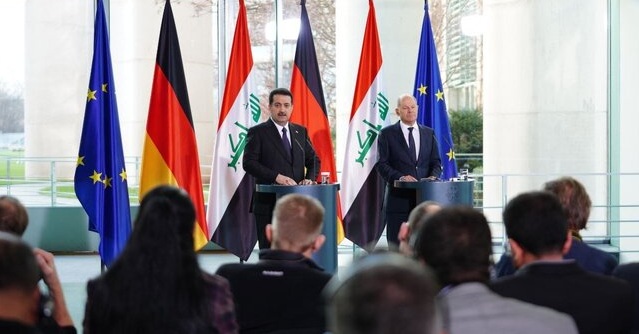Germany, which before Ukraine war relied on Russia for 55 percent of its gas imports, is looking to diversify its LNG imports after deals with Qatar and the US to cut heavy reliance on a few exporters and ensure its needs are met in the coming years. As one of the industrial hubs of Europe, it has suffered huge losses since the imposition of sanctions and ban on Russia energy. According to economists, its cumulative loss can reach €220 billion ($238.5 billion) by the end of 2023. It is approximately 6.5 percent of Germany’s annual economic output.
On the other side, Iraq, which has been one of the importers of gas in the past decades, hopes that in the wake of new gas discoveries in the northern regions of the country, as well as signing an agreement with companies that possess the technology to process Associates Petroleum Gas (APG), it can reduce gas imports and in next stages turn into a gas exporter.
“In the situation where the world (energy) market is suffering and with the increase in global demand that has led to high prices, Iraq has the possibility to use investment plans in gas and oil production to meet the needs of Germany and the world market,” Iraqi PM said in a joint press conference with the German chancellor.
Without elaborating on the amount of gas German hopes to import from Iraq, Scholz said that he reached an agreement with the Iraqi PM about possibly delivery of gas to Germany from Iraq.
Khor Mor is one of the biggest Iraqi gas fields, capable of producing around 452 million square feet per day. Iraqi Kurdistan region has been working with foreign companies on oil and gas exploration and production since 2007.
According to statistics, Iraq has 3.5 trillion cubic meters of proven gas reserves, more than 60 percent of which located in the southern regions. Three quarters of the country’s natural gas resources are APG, but unlike the southern regions, most of northern natural gas resources are without oil and located in Kurdistan regions like Ajil, Bai Hassan, Jambor, Khor Mor, Al-Ahmar, Al-Qaida, Mansooriyah, Khashim, and Chamchamal. Given these statistics, Iraq ranks 11th among world gas reserve holders.
Before a dispute between central government and the autonomous region over Erbil’s independent exports of gas and oil, which led to a court ruling banning activities of foreign companies like Dana Energy of the UAE and other partners in Khor Mor gas field in July, the Kurdistan daily natural gas production was 542 million square meter. This is while Kurdistan in addition to its needs for gas for household and industrial uses is in need of daily 1.6 billion square meters for its power production. This indicates Iraq’s need for investment by foreign companies for the development of gas fields in the region and a significant increase in gas production rates. In addition, naturally, settling the differences between Erbil and Baghdad is necessary to reopen production activities.
Before his Germany trip, PM al-Sudani met with Kurdistan region’s PM Masrour Barzani. The talks focused on ways to integrate the central and regional governments’ activities. Given Baghdad-Berlin agreements, it can be concluded that meeting Barzani was not irrelevant to al-Sudani’s Europe visit. On March 28, 2022, in a conference arranged in the UAE by the Atlantic Council think tank, Barzani claimed for the first time that Iraqi Kurdistan will soon export gas to Europe. According to the region’s ambitious plan, Erbil should increase its gas production to 40 billion cubic meters per year by 2035.
A new rocket attack on the region’s gas facilities in coincidence with Berlin agreement once gain brought to surface the challenge ahead of operationalizing gas exports to Europe. In the past months, and especially in June, several rockets hit Khor Mor gas field. Some said the PKK forces were behind the attacks while the spokesman to Iraqi Hezbollah Brigades said that based on information obtained by security and intelligence forces, Turkish-aligned mercenary groups in Tuz Khorma were responsible for the attacks.
Inter-Kurdish disputes are compounding the challenge surrounding gas exports. As much as the Kurdistan Democratic Party (KDP) is in a haste to realize gas exports, the Patriotic Union of Kurdistan (PUK) is against it as it wants incorporation of gas case into other contentious cases.
Al-Sudani’s long step for final settlement to power shortage case
Energy made the top case of discussion during al-Sudani’s Berlin visit. Striking a deal with Siemens to renovate and expand Iraq’s power grid marks an achievement the PM can advertise as a sign his first European trip was successful.
“We agreed with Siemens to expand production, transfer, and distribute power. We have a successful experience with Siemens and we announce our desire for other investment companies to enter Iraq.... Our meeting today lays the cornerstone for strategic relations with Germany,” al-Sudani said.
The German Ministry of Economy announced that Siemens Energy CEO Christian Bruch signed an MoU with Iraqi Electricity Minister Ziad Ali to increase electricity production by 11 gigawatts.
Iraq has power production deficit, especially in the hot seasons,
something causing public discontentment and even street protests over
the past years. The Iraqi power imports are largely tied to geopolitical
issues. The US and Saudi Arabia announced a plan to connect Iraqi to
the Persian Gulf or even Jordan and Egypt power grid in a bid to cut its
reliance on Iranian power. But despite Arab promises for power
delivery, Iraq’s agreement with Siemens demonstrates that Iraqi leaders
think that it is impossible to get sustainable power supplies from the
Arab countries and Baghdad should move to independence in this
industry.
/129

